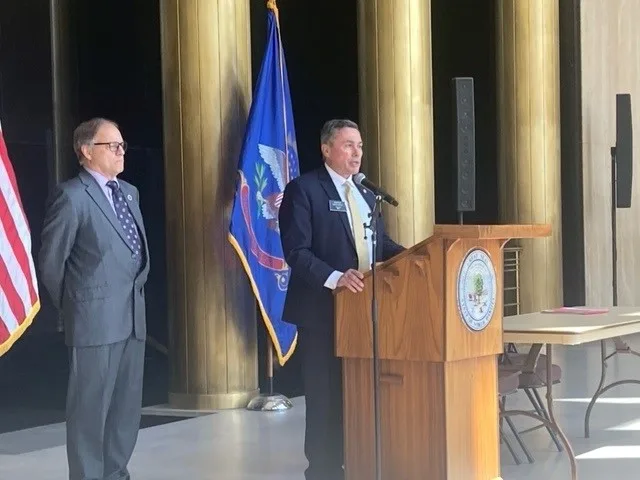

BISMARCK – As the North Dakota Legislative session winds down, the majority leaders on both sides shared their thoughts on the session at a press conference Friday.
Senate Majority Leader Sen. David Hogue, R-Dis. 38, Minot, addressed the budget surplus of $2.7 billion.
“At least on the Senate side we felt that some of it had to go back to the people,” said Hogue. “We set the target at 20%.”
Hogue said the goal was to have $500 million to $600 million go right back to the taxpayers through tax relief. The legislature ended up with an income and property tax relief package of $515 million.
Hogue said the increase in the state budget was more than any other in past years, much due to inflation.
“I hope we advanced expectations,” said Hogue. “When we have these budget surpluses, we always prioritize getting it back to the people, and not spend them. I hope we drove that narrative, and I think we did.”
“People say increased spending,” said House Majority Leader Rep. Mike Lefor, R-Dis. 37, Dickinson. “We need to focus on what we spent the dollars on. We invested in our state. As a result of the work we have done, we haven’t even talked about the fertilizer plants that are looking to come to North Dakota. We all know that the price of fertilizer has skyrocketed in the last several years. Having fertilizer plants in this state is a big deal for our ag producers.”
Hogue also addressed the Legacy Fund.
“I think what the people of North Dakota are beginning to realize is the Legacy Fund now has enough momentum where it’s starting to throw off amazing amounts of revenue for the next two to three bienniums,” said Hogue.
Hogue mentioned section three of Senate Bill 2330 which relates to the Legacy Fund.
“The Legacy Fund could double in three bienniums,” said Hogue. “Imagine what that would do for earnings. The Legacy Fund started off as this small thing, but it’s now only 12 years old, and it dwarfs all of the other funds combined.”
Lefor answered a question concerning several bills relating to gender identity, public libraries, and the governor’s vetoes.
“I think there’s a natural tension between the legislative branch and executive branch, as in any state,” said Lefor. “I would say the executive branch has done a great job laying out their vision, and they’ve been more than hospitable in working with legislative leadership. But there are times when you’re passionate about something, frustrations do come in. But at the end of the day, I would say that’s kind of water under the bridge at a certain point.”
Lefor added he believes the legislative and executive branches will continue to work solidly together.
“I would say that prohibiting surgeries and drugs and things like that are important for our youth, and to be able to make decisions when they’re adults,” said Lefor.
Hogue said on the Senate floor, due to certain variables including some amendments needing to be reviewed by legislative council, legislative leaders are unsure if the session would finish Friday evening or early Saturday.